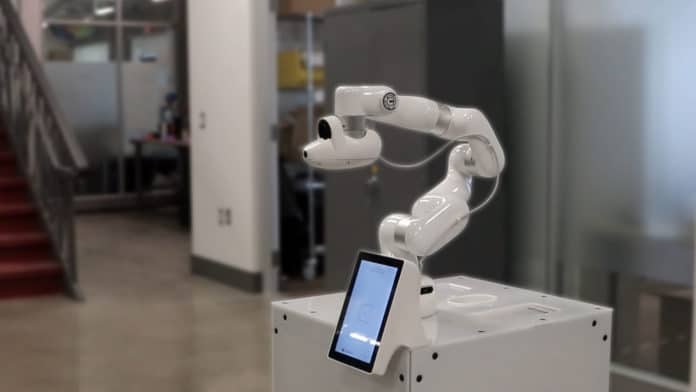Cobionix, a University of Waterloo spinoff company, has developed Cobi, a versatile autonomous robotics platform capable of vaccinating human patients with intramuscular doses without using a hypodermic needle.
Cobi is claimed to be the first-ever robot to perform the autonomous robotic intramuscular injection, paving the way to improved patient care in an industry faced with labor shortages. The multi-sensing, intelligent robot can not only work safely alongside humans but also learn from them and become smarter over time.
It is equipped with LiDAR, cameras, and sensors to streamline and automate the vaccination process. After pre-registering for a vaccination online, patients will show up at a clinic or other location that utilizes a Cobi robot. The patient arrives and stands next to the robot, multiple 3D depth sensors detect their presence, and the camera reads the person’s ID. The robot uses LIDAR sensors and artificial intelligence position tracking to identify the body and then, using 360-degree depth perception, guides the needleless “hand” into the proper position on the person’s arm to administer the drug.
The vaccine itself is subsequently injected in the form of a high-pressure jet of fluid that passes through a human-hair-width orifice. Cobi can inject patients without the assistance of a health care professional and without the use of a needle. Once the vaccine has been injected, the single-dose capsule is disposed of in a compartment labeled sanitary waste, and the patient’s arm is cleaned again. The company hasn’t revealed many details about the technology at this time.
“Cobi is a versatile robotics platform that can be rapidly deployed to complete tasks with 100 percent autonomy,” said Tim Lasswell, co-founder, and CEO of Cobionix. “We outfitted Cobi to use a needle-free injection technology and to demonstrate that patients could receive intramuscular injections, such as vaccines, without needles and no involvement from a healthcare professional.”
“Autonomous solutions such as Cobi could protect healthcare workers, reduce healthcare costs, and improve patient outcomes,” Zamani said. “The autonomous nature of Cobi also dramatically reduces the infrastructure requirements of vaccine clinics which could help reach populations in remote areas with limited access to medical care.”
